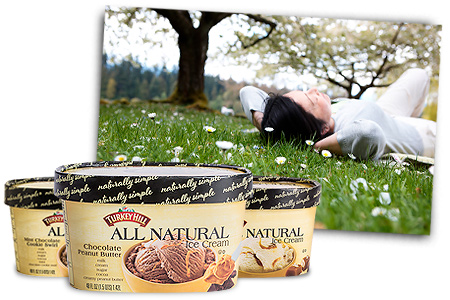When you think of the word natural, what images come to mind? Go ahead, think about it for a minute. What do you think about when you read, hear, or think about natural?
I think about canoeing in the pristine waters of northern Minnesota, freshly washed sheets snapping in the breeze, hiking through the woods, inhaling that early morning outside scent, the smell of wood burning...things like that.
Merriam-Webster lists 15 definitions for the adjective natural, and 4 more for the noun natural. This word can mean a lot of different things! Recently, I've been discovering just how much people's perceived notions of this word vary. Manufacturers totally know this, and they use this ambiguous word to rope us into buying healthier foods that actually...aren't.
We've all seen the claims on boxed, bagged, and canned foods sold everywhere. Remember this 7Up commercial?
So, what are the 100% all natural ingredients in 7Up? According to their own website, 7Up's fresh, all natural ingredients consist of: carbonated filtered water, high fructose corn syrup or sugar, natural flavors, citric acid, potassium citrate, calcium disodium EDTA.
I'm not trying to attack 7Up--you can certainly find a lot worse ingredients in a soda. My point here is that manufacturers throw around the word natural quite a bit, not as a substantiated fact, but as a marketing technique.
Check out these examples:

I could go on, but you get the point. A lot of products make "all natural" claims, but what exactly does that mean?
Unfortunately, it means absolutely nothing. There are currently no standards, no regulations, no rules about the use of the word "natural." It's all marketing. When people see those words, all natural, they immediately think the food, makeup, or other product is better for them, when in actuality, the product may or may not be any more natural than any other product on the shelf.
Kashi recently got some bad press for this. When an independent lab tested the soy in their Go Lean! product line, it was found to be 100% GMO (genetically modified), and this made people really mad. Our family buys Kashi's shredded wheat cereal, which is certified 100% organic, but the Go Lean! products do not have a particular label. They don't even claim to be all natural. However, because of Kashi's reputation, commercials, and natural looking boxes, people assume that all of the ingredients are natural, which is exactly what they want you to do.
Don't be fooled by natural looking boxes, foods shelved in the "natural" section of the grocery store, or even bright yellow stars that claim food is all natural. Turn to the side or the back and read the list of ingredients for yourself. You might be surprised at what you discover when you read the ingredients. In fact, this was one of the tactics I used on myself (and still do sometimes!) when I was at the grocery store and really tempted to buy food that looked so delicious. Once I actually started reading the ingredients, putting the uhealthy choice back on the shelf got a lot easier.
You even need to read the ingredients on foods labeled organic, 100% organic, or non-GMO verified. These labels are great, but they don't give an across the board promise. Even though the ingredients may be organic or non-GMO, you still need to be informed as to what those organic ingredients are! Just because they're not genetically modified or pesticide-laden doesn't make them automtically good for you. As Dr. Ben Lerner says, organic sugar is still sugar.
Be an informed consumer. When you go to the store, try to ignore the giant marketing claims on the front of the product, and instead, examine the ingredients. Know what's in the things you put in and on your body.
No comments:
Post a Comment